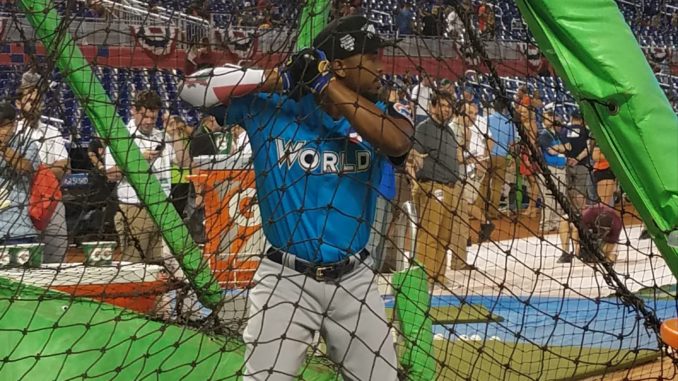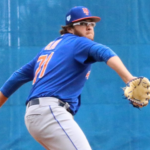
Baseball is entering a youth movement across the game. While teams being concerned with the financial bottom line is nothing new, the landscape has moved to a new level. Where we lie on the calendar now, in between the time where the games top prospects either signed an extension or were shipped out to the minor leagues, many of these said players find themselves in a sort of bus-riding baseball purgatory until the “Super Two” cutoff date passes.
However, this season a handful of the games’ top prospects made the big league roster out of camp, which started to curb a trend of service time manipulation that cannot be admitted to. Three of the top four of MLB.com’s Top 100 Prospects made a major league roster to start the season.
The other trend were top prospects, who were clearly ready for the show, signing extensions that make the “Super Two” meaningless. This was the case with number-three Eloy Jimenez. After being relegated to minor league camp, Jimenez agreed to a six-year, $43 million deal. Magically, a handful of days later, he was ready to join the big league team out of camp.
Not in a “Super Two” situation, but Ronald Acuna Jr. agreed to a $100 million deal that many called well below market value. However, it is really difficult situation to turn down that life-changing money being guaranteed.
Additionally, Acuna’s teammate, Ozzie Albies recently agreed to a deal that many feel is even worse. Albies signed a seven-year, million deal that locks him up into a Braves jersey. While the deal does seem extremely low for a 21-year-old power hitting second baseman coming off a 21 homer season, Albies has still guaranteed that he is a multi-millionaire and will still get out of the deal in his late twenties. The issue at hand, is that Albies would likely have earned more ultimately when he got to arbitration, which would probably be close for Acuna.
LA Sports Management agent Daniel Szew completely understands this situation. While Szew does not represent any of the players mentioned in this article and has no connection to them, his agency deals primarily with Latino players, many of whom come from much more “difficult financial and socio-economic backgrounds.” While there is a lot of money to be made from International bonuses, most Latin American or International players receive a small chunk of that.
“It’s easy to criticize people, but one should always put themselves in a player’s shoes,” Szew said. “How much money is enough? The right answer is as much as possible. The real answer is it depends on circumstances and what one wants out of life.”
With the financial landscape of Minor League Baseball, and such a small piece of the pie going to those players, life-changing money can go a long way. Additionally, the money is guaranteed and can change the lives of these families for generations and for even their native countries.
“Look at the situation currently in Venezuela and tell one of these players that they are leaving money on the table,” Szew said. “Millions of their own people are starving, without electricity, etc. – do what’s right for you, but just make sure you make an informed decision. Also, don’t forget to give back, I feel like that’s part of everyone’s duty, not just athletes. You may sign for X dollars today, but another player who might not be as good as you might sign for much more money down the road. As long as you can live with that, make a choice and move forward, don’t look back.”
While Szew said that he believes that teams are doing everything in their power to win with the best 25 players that they can he also said that he feels that “systematically things need to get better so that teams are not ‘incentivized’ in keeping players in the minors.”
With changes that have seen spending dry up for several free agents during the off season, including Dallas Keuchel and Craig Kimbrel still being on the market into mid-April this season, there has clearly been additional motivation to get a deal done and be financially set early.
“I think the slowness of free agency over the last couple of years – mainly for the so called mid-level players – has had an effect on both teams and players alike,” Szew said. “At the root of it, younger, productive players have become very valuable, but at the same time there are plenty of veterans who still have a lot to give to the game that shouldn’t be phased out as seems to have happened.”
With times changing throughout the game, Szew said that finding a balance between a place where young players can continue to blossom and veterans can continue to contribute is up to the industry as a whole to find a common ground.
Regardless of how this plays out, baseball has some important and game-changing decisions to make, as the current collective bargaining agreement is up in 2021. If the current climate continues, and tension grows between the players and the owners, this could be a very volatile situation.
Here’s hoping that the trend of top prospects like Victor Robles and Fernando Tatis Jr.making the big league teams continue, making the “Super Two” less of an issue, and there is at least one less problem. Regardless, younger and cheaper talent seems to be the thing to continue into the future. Expect more extensions and players getting paid early to continue.
Let’s just hope that baseball finds the common ground before another work stoppage becomes inevitable.
Ryan Palencer is a lifelong baseball fan who covers the Triple-A International League upper level MiLB prospects. He is located in Indianapolis, which features the AAA Indians. Ryan has covered Minor League, Major League, and All-Star games with Pirates Prospects prior to joining Prospects1500. Follow him on Twitter @RyanPalencer.





Leave a Reply